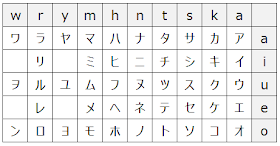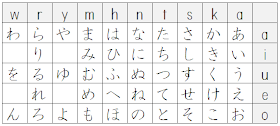Japanese kanji list for your practice, with symbols, menaing, and romaji
| 一(one) | 右(right) | 雨(rain) | 円(circle) | 王(king) | 音(sound) | 下(bottom,under) |
| ichi hajime hito(tsu) |
u migi yuu |
u ame ama |
en maru |
ou | on oto ne |
ka ge shita shimo |
| 火(fire) | 花(flower) | 貝(shellfish) | 学(learn) | 気(notice, conscious, feeling) | 九(nine) | 休(rest) |
| ka hi |
ka hana |
kai gai |
gaku mana(bu) |
ki ke |
kyuu ku kokono(tsu) |
kyuu yasu(mu) |
| 玉(ball) | 金(money, gold) | 空(sky) | 月(moon) | 犬(dog) | 見(see) | 五(five) |
| gyoku tama |
kin kon kane |
kuu sora a(ku) kara |
getsu gatsu tsuki |
ken inu |
ken mi(ru) mi(eru) |
go itsu(tsu) |
| 口(mouth) | 校(building) | 左(left) | 三(three) | 山(mountain) | 子(kid) | 四(four) |
| kou kuchi |
kou | sa hidari |
san mi(tsu) sabu |
san yama |
shi su ko |
shi yo(tsu) |
| 糸(thread, yarn) | 字(letter, character) | 耳(ear) | 七(seven) | 車(car) | 手(hand) | 十(ten) |
| shi ito |
ji | ji mimi |
shichi nana |
sha kuruma |
shu te |
jyuu |
| 出(exit) | 女(women) | 小(small) | 上(upper) | 森(forest) | 人(person) | 水(water) |
| shutsu de(ru) da(su) |
jyo nyo onna me |
shou ko chii(sai) |
jyou ue kami nobo(ru) |
shin mori |
jin hito nin |
sui mizu |
| 正(correct) | 生(alive) | 青(blue) | 夕(evening) | 石(stone) | 赤(red) | 千(thousand) |
| sei shou tada(shii) |
sei shou i(kiru) |
sei shou ao |
seki yuu |
seki koku shaku ishi |
seki shaku aka |
sen chi |
| 川(river) | 先(edge) | 早(early) | 草(grass) | 足(foot) | 村(village) | 大(big) |
| sen kawa |
sen saki |
sou haya(i) |
sou kusa |
soku ashi ta(su) |
son mura |
dai oo(kii) |
| 男(male) | 竹(bamboo) | 中(center, inside) | 虫(worm) | 町(town) | 天(sky) | 田(paddy) |
| dan nan otoko |
chiku take |
chuu naka |
chuu mushi |
chou machi |
ten | den ta |
| 土(soil) | 二(two) | 日(day, sun) | 入(enter) | 年(year) | 白(white) | 八(eight) |
| do tsuchi |
ni futatsu |
nichi jitsu ka hi |
nyuu hai(ru) i(ru) |
nen toshi |
haku byaku shiro |
hachi ya(tsu) |
| 百(hundred) | 文(sentence) | 木(tree) | 本(book) | 名(name) | 目(eye) | 立(stand) |
| hyaku momo |
bun mon aya fumi |
moku boku ki |
hon moto |
myou mei na |
moku me |
ritsu ta (tsu) |
| 力(power) | 林(grove) | 六(six) | ||||
| riki ryoku chikara |
rin hayashi |
roku mu(tsu) |
||||
Japanese kanji sentences and words you can see as a dictionary or guide
There are some kanjis which I have already picked up and explained its details, like kanjis for numbers and so forth, but I am introducing you all kanji with a guide for meaning. Each sentence has at least one kanji, sometimes does more than two. You can pronounce all the sentences because I am writing its romaji, but the meanings of these words are unknown for you probably. If so, take these sentences for your lesson to extend your vocabulary too, not only as a kanji practice.- 学校のテストで一いをとった
がっこうのてすとでいちいをとった
Gakkouno tesutode ichiiwo totta
I got a number one on a school test. - 右手はおはしをもつほうです
みぎてはおはしをもつほうです
Migitewa ohashiwo motsuhou desu
A right hand is a one to hold chopsticks. - きょうは雨か~
きょうはあめか~
Kyouwa ameka~
It’s rainy toady. - 円をかくのへたなんだ
えんをかくのへたなんだ
Enwo kakuno hetananda
I am not good at drawing a circle. - こんどはきみが王さまのやくね
こんどはきみがおうさまのやくね
Kondowa kimiga ousamano yakune
You take a role of a king this time. - とおくのほうで音がする
とおくのほうでおとがする
Tookunohoude otogasuru
I hear some sounds over there. - たいじゅうが上下する
たいじゅうがじょうげする
Taijyuuga jyouge suru
My weight goes up and dwon. - 火をもっとよわくしないと
ひをもっとよわくしないと
Hiwo motto yowakushinaito
You should reduce heat much. - 花をプレゼントされるのは意外といいよね
はなをぷれぜんとされるのはいがいといいよね
Hanawo purezento sarerunowa igaito iiyone
It is unexpectedly good to get flowers as a present. - 森の中にいるのは気もちいい
もりのなかにいるのはきもちいい
Morinonakani irunowa kimochiii
It is comfortable to be in a forest. - もう3日も学校を休んでしまった
もうみっかもがっこうをやすんでしまった
Mou mikkamo gakkouwo yasundeshimatta
I have already been absent from school for 3 days. - ほう玉を手に入れたい
ほうぎょくをてにいれたい
Hougyokuwo teniiretai
I want to get a gem. - お金をかせぐのは大へんだとおもった金よう日
おかねをかせぐのはたいへんだとおもったきんようび
Okanewo kasegunowa taihendato omotta kinyoubi
On Friday, I thought it was tough to earn money. - 夕がたに空を見上げたら、月が見えた
ゆうがたにそらをみあげたら、つきがみえた
Yuugatani sorawo miagetara, tsukiga mieta.
I saw a moon when I looked up the sky in this evening. - 犬はかわいい
いぬはかわいい
Inuwa kawaii
A dog is cute. - 口の左がわが赤くなっている
くちのひだりがわがあかくなっている
Kuchino hidarigawaga akakunatteiru
A leftside of a mouth got reddish. - 子どもといっしょに山にいく日は五日ごだ
こどもといっしょにやまにいくひはいつかごだ
Kodomoto isshoni amaniikuhiwa itsukagoda
I go to a mountain with my kid in five days - 車から糸が出ている
くるまからいとがでている
Kuruma kara itoga deteiru
A thread comes from a car. - かれはいつも小さい字をかく
かれはいつもちいさいじをかく
Karewa itsumo chiisai jiwo kaku
He always write a small character. - 耳に虫が入るのと、目と耳と口に水が入るのはどっちがいい?
みみにむしがはいるのと、めとみみとくちにみずがはいるのはどっちがいい?
Mimini mushiga hairunoto, meto mimito kuchini mizugahairunowa docchigaii ? Which do you like, a wrom comes in your ear or water comes in your eyes, ears, and mouth? - 川のちかくで千人もの人が生きているのがはっ見された
かわのちかくでせんにんものひとがいきているのがはっけんされた
Kawano chikakude senninmonohitoga ikiteirunoga hakkensareta
A thousand people near a river were found alive. - 青い石を草のたくさん生えている村で正しくならべると土から天にのぼる林が出てくるだろう
あおいいしをくさのたくさんはえているむらでただしくならべるとつちからてんにのぼるはやしがでてくるだろう
Aoiishiwo kusanotakusanhaeteirumurade tadashikunaraberuto tsuchikaratenninoboru hayashiga detekurudarou
A grove would appear and grow into the sky if you could sort blue stones correctly in a village where there are many grasses. - 足の大きい男はその町にはすんでいる
あしのおおきいおとこはそのまちにすんでいる
Ashino ookiotokowa sonomachini sundeiru
A man with big feet lives in the town. - 白い竹と木が百本生えた年に、なにかがおこる
しろいたけときがひゃっぽんはえたとしに、なにかがおこる
Shiroitaketokiga hyapponhaetatoshini, nanikagaokoru
Something would happen in a year when a hundred of white bamboos and trees appear. - 文をかくのがにが手
ぶんをかくのがにがて
Bunwo kakunoga negate
I am bad at writing a sentence - 立っているのにつかれた
たっているのにつかれた
Tatteirunoni tsukareta
I got tired to keep standing.
Japanese, kanji, chart, list, meaning, romaji




































